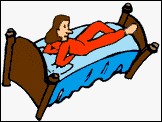Restless Legs Syndrome
General description of RLS
 Restless Legs Syndrome (RLS) is a neurological disorder, where the sufferer experiences uncomfortable feelings in the legs. These feelings are often described as tingling, crawling, or prickly sensations, but more annoying and irritating than painful. The sensations are not the same as 'Pins and Needles' due to poor circulation. RLS can cause severe sleep disturbance, which in turn, can cause daytime tiredness. It usually occurs when the sufferer is sitting or lying down, and more noticeable in the evening or when retiring to bed. Movement or exercise offers some temporary relief, but the sensations return when activity ceases. The symptoms are worse when when the person is stationary, and may experience leg or feet movements when sitting still or in bed. RLS sufferers are often said to be a 'fidget', as their legs are never still. They constantly feel the need to stretch their limbs to ease the discomfort. It is not uncommon for patients with RLS to suffer from insomnia.
Restless Legs Syndrome (RLS) is a neurological disorder, where the sufferer experiences uncomfortable feelings in the legs. These feelings are often described as tingling, crawling, or prickly sensations, but more annoying and irritating than painful. The sensations are not the same as 'Pins and Needles' due to poor circulation. RLS can cause severe sleep disturbance, which in turn, can cause daytime tiredness. It usually occurs when the sufferer is sitting or lying down, and more noticeable in the evening or when retiring to bed. Movement or exercise offers some temporary relief, but the sensations return when activity ceases. The symptoms are worse when when the person is stationary, and may experience leg or feet movements when sitting still or in bed. RLS sufferers are often said to be a 'fidget', as their legs are never still. They constantly feel the need to stretch their limbs to ease the discomfort. It is not uncommon for patients with RLS to suffer from insomnia.How common is Restless Legs Syndrome
It is said that about 14 percent of the population will experience RLS at some stage in their lives. The condition is more common in the elderly, and for some unknown reason affects women more than men. About a third of all RLS sufferers are thought to inherit this from one or more parent. This genetic form is often more severe and difficult to treat.
Periodic Limb Movement Syndrome
Some individuals with RLS, also suffer from Periodic Limb Movement Syndrome (PLMS).
This is characterised by the sudden jerking of the limbs during normal sleep. This condition disrupts proper sleep, and can also lead to daytime tiredness.
This is characterised by the sudden jerking of the limbs during normal sleep. This condition disrupts proper sleep, and can also lead to daytime tiredness.
The afflictions are hard to diagnose, and can be confused (or be a combination) with poor circulation. Some stimulants such as coffee, tea or even chocolate can aggravate these conditions, so it's recommended to get advice from your doctor.
Possible Treatments
One cause of Restless Legs Syndrome is a nutrient deficiency and a supplement of iron (B12) may help, but this must be done under the direction of your doctor. Some cold, sinus and allergy medications, high blood pressure tablet, anti-depressants etc can worsen the symptoms.
Regular exercise (if that is possible) has been found to help in many cases. Stretching the calves and thighs just before bedtime may give some relieve. Also, a hot bath and a leg massage can help. In really severe cases of RLS and PLMS, there are some drugs that have been used, but the side effects can be worse than the cure.
Note: This information is not medical advice. Always see your doctor if you have a health problem.